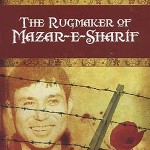 The Themes in The Rugmaker of Mazar-e-Sharif includes the importance of the relationship between culture and identity
The Themes in The Rugmaker of Mazar-e-Sharif includes the importance of the relationship between culture and identity
You have to ask yourself the question, “What becomes of a person in our world if political developments made it impossible for him to live in his own country?” The politics of displacement creates an identity crisis. Thinking outside the square about the issue of identity; “Is ‘identity’ portable?”
Conflict has Far-reaching Consequences
The text articulates the many and varied ways conflict affects individuals and communities. The immediate and personal costs of war are often obvious. Gorg Ali and Rosal Ali are killed. Najaf is injured when a bomb explodes above his house and he suffers financial hardship and shame as a result of this injury. Ultimately, Najaf is forced to flee Afghanistan when the Taliban take control of Mazar-e-Sharif.
Long Lasting Trauma from Violent Events
The text also captures the long-lasting emotional trauma that accompanies these violent events. Consider Najaf’s emotional state while recovering from his injured leg. He is uncharacteristically despondent, angry and jealous. His inability to contribute to the family income and, worse, calling on his brother’s charity, make him feel “sick with shame” (p.137). While these feelings subside when Najaf is finally cured, other key incidents show that single events have lifelong ramifications. Najaf’s grief for Gorg Ali, for instance, does not diminish and he sheds disconsolate tears in his interview at Woomera 18 years later. Najaf’s mother, too, endures lifelong grief. Just before the rocket attack, Najaf comments, “her heart was still broken after the death of Gorg Ali a year before, and would stay broken for the rest of her life” (p.13).
Indirect Consequences of Living with Conflict
Long-term consequences of conflict also arise indirectly. Living with conflict makes Najaf perpetually fearful. He is so accustomed to being threatened that he inanely worries that the Australian authorities have been fed misinformation. To avoid forcible recruitment into either the communist or mujahedin forces, Najaf has to keep his “eyes peeled” and “one part of [his] brain … always on alert” (pp.152-3). He is tense, vigilant and constantly “ready to respond” to seemingly imperceptible signals (p.153). Najaf’s safety and security are constantly undermined.
Insecurity Leads to a Sense of Powerlessness
Najaf sums up this state of mind when he realises, early in his rug-making apprenticeship, that “this future of learning and gaining greater and greater skill all depended on things that I couldn’t control” (p.154). To cope, Najaf trains himself “not to think too far into the future” (p.154). This demonstrates a terrible and often hidden consequence of war: people lose hope.
